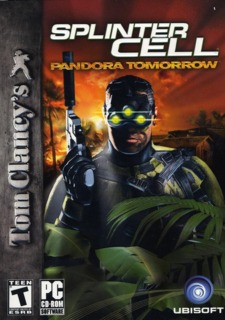You can do anything once.
Splinter Cell truly felt like a stealth game; it was quiet, suspenseful, and smart. Pandora Tomorrow, however, doesn't feel like it's entirely sure of what it's trying to accomplish. It seemed apparent to me almost immediately that Pandora Tomorrow was not as sharp on any of the fronts, and everyone looks for at least some improvement in a sequel. Sure, its still part of the Splinter Cell series, from a good general developer, and with Clancy's seal of approval; but by comparison, it's a little disappointing.
Pandora Tomorrow begins when the US Embassy at Dili is attacked by the terrorist Suhadi Sadono. Upon investigation, Intelligence discovers that Douglas Shetland, the head of a security business and a friend of Sam Fisher, is being held hostage inside for his information. Sam infiltrates to rescue Shetland, and he stumbles upon the plan that Sadono has to attack the US with bioterrorism tactics. Sadono places contained smallpox all over the country, and every day he makes telephone calls to the runners and tells them "Pandora Tomorrow," which delays the release of the virus for one more day. I thought that this story was the best and most interesting yet.
From now on, I will go down the numerical attributes listed above and tell why it got the score I gave it. Gameplay being the first factor, I felt a little let down in some places and impressed in others. Possibly as part of the graphics, it just didn't feel as fluid as the first one to me in a lot of ways. There ARE a few things I'm going to give it credit for. One of them is that they put a laser on the pistol. The pistol in the first Splinter Cell was impossibly difficult to aim - even at point blank. Sure, maybe the laser isn't stealthy and maybe you can practically snipe with the pistol now, but I'd rather have it be unrealistically accurate than not accurate at all. If nothing else, it's fun. The second thing (a little thing) is health packs; those were a little unrealistic, and they have fixed that. Try stuffing 5 books in your back pocket, and you'll see why the health packs from SC1 were a bit of a stretch. Third, you have the whistle - it sounds pretty bad, but at least intentionally attracting enemies' attention is easier than in SC1 (in the first, you practically had to run circles around them to get their attention). Also, while maybe this doesn't fall under gameplay, the cutscenes do look a lot better than the first and are therefore easier to pay attention to. Finally, some levels are not fun at all, while others are new and interesting. Sneaking around a train was fun, and infiltrating LAX was kind of unique. However, some parts were unrealistically hard, and the new jungle missions that were supposed to be cool just didn't flow. Trial-and-error situations are more common here - while I was never stuck in the first one for more than 5 or 10 minutes, here I can remember a few instances where I was stuck for the better parts of an hour.
Secondly, we have graphics. As the fans remember, Splinter Cell was a good-looking game, and especially for its time. Some things looked a little pixelated but everything was typically smooth and somewhat polished. Here, the textures are somewhat... weak. The frame rate is down noticeably and the gameplay suffers because of it. It's a little harder to 'read' the night vision and thermal, I thought, and seeing as how you use them a lot, this wasn't a good thing at all.
The next thing is sound. As always, Michael Ironside does a good job as our sneaky anti-hero Sam Fisher - however, I felt that the rest of the voice-acting staff was a little weak. The voice of Lambert sounded really forced this time, and they brought in someone new for Grimsdottir that really didn't sound right. The voice of Sadono was pretty good overall - the writing was good but not great, and unfortunately Sadono didn't have a lot of selling lines until the end of his involvement with the story. As for the rest, music is decent and the sound effects were good, but I still think that the music was better in Splinter Cell 1.
Because the main campaign didn't encourage me to play it again, I wouldn't have given Pandora Tomorrow much of a value rating. However, one entirely original (and very cool) factor in Pandora Tomorrow is the online versus mode. This gives it a lot of replay value, and it added a totally new dimension to the series. While I personally didn't ever take the time to learn how to play it, it is the most original type of multiplayer I have seen in a long time, and thus those more curious about it than myself should find a good amount of value. What's more, SCPT didn't spend much time as a $50 game, and it is still dropping.
The tilt mostly lies in its innovation in multiplayer, but aside from that the single player was a little disappointing. Aside from the aforementioned multiplayer, nothing stood out as excellent for this title or had substantial replay value.
In conclusion, Splinter Cell: Pandora Tomorrow has some cool new stuff, multiplayer being most prominent, and it does continue the suspense and good storytelling demonstrated by its prequel. However, it doesn't feel nearly as smooth as the first one did, and it proves to be a little less special than maybe we all had hoped. So, if you're just getting into Splinter Cell series, I would recommend the first or the third to start with (read my review of SC3: Chaos Theory), and to leave this one for last. As they say, you can do anything once - that is proven to be the case for the Splinter Cell series.

